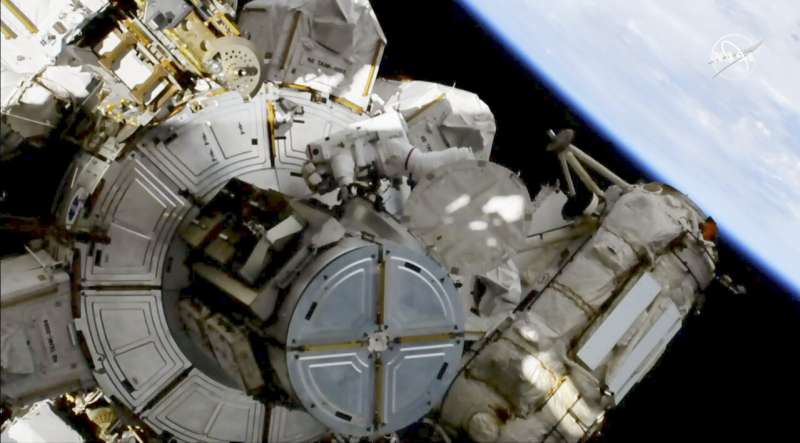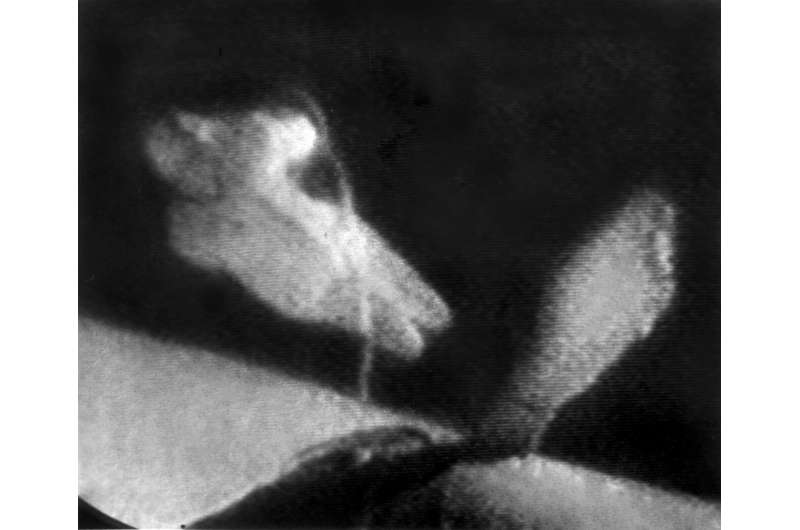This image provided by NASA shows astronauts Andrew Morgan on a spacewalk outside the International Space Station on Friday, Oct. 11, 2019. Morgan and Christina Koch are replacing decade-old batteries in the station's solar power network with new and improved lithium-ion versions. It's the second of five spacewalks planned this month to install six new batteries that arrived via a Japanese supply ship two weeks ago (NASA via AP)
Astronauts replaced more oversized batteries outside the International Space Station on Friday, as news broke of the death of the world's first spacewalker.
NASA interrupted live TV coverage of its second spacewalk this week to announce the death of Russian cosmonaut Alexei Leonov at age 85.
His 12-minute spacewalk on March 18, 1965, preceded the first U.S. spacewalk by Ed White by less than three months.
"A tribute to Leonov as today is a spacewalk," Mission Control in Houston reported. There have been 227 spacewalkers since Leonov's feat.
Leonov also was the Russian commander of the Apollo-Soyuz joint space mission in 1975, a prelude to the international cooperation seen aboard the current space station.
Five days after their first spacewalk, U.S. astronauts Andrew Morgan and Christina Koch swiftly continued swapping decade-old batteries in the station's solar power network with new and improved lithium-ion versions. These new batteries are so powerful only one is needed for every two of the hydrogen-nickel units, which will be junked.
By the midway point of Friday's spacewalk, Morgan and Koch had finished installing three new batteries 260 miles (420 kilometers) up. Given the hefty battery size—about half a refrigerator with a mass of 400 pounds (180 kilograms)—the astronauts had to take turns holding each unit as they moved along the station's sprawling framework. With that successfully behind them, they got a jump on next week's spacewalk.
In this March 18, 1965 photo made from a television screen, Soviet cosmonaut Lexei Leonov, left, floats in space at the end of a lifeline during a twenty minute trip outside the Russian spacecraft Voskhod-2 during an orbital flight. On Friday, Oct. 11, 2019, the Russian space agency Roscosmos announced that Leonov, who became the first human to walk in space 54 years ago—and nearly didn't make it back into his capsule—died in Moscow. He was 85. (AP Photo)
It was the second of five spacewalks planned this month to install six new batteries that arrived via a Japanese supply ship two weeks ago. Morgan and Koch began the outdoor work Sunday. Morgan will be accompanied Wednesday by NASA's Jessica Meir, the other woman on board.
Morgan has been aboard the space station since July. Koch is two-thirds of the way into what will be the longest single spaceflight by a woman, 300-plus days. On the fourth spacewalk of this series planned for later this month, Koch and Meir will perform the world's first all-female spacewalk.
Friday marked the 35th anniversary of the first spacewalk by an American woman, Kathryn Sullivan, on Oct. 11, 1984. The Russians beat the Americans there, too. Three months earlier, cosmonaut Svetlana Savitskaya became the world's first female spacewalker.
© 2019 The Associated Press. All rights reserved.

























